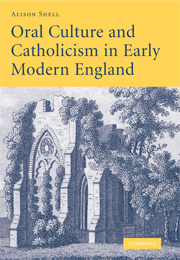Book contents
- Frontmatter
- Contents
- List of illustrations
- Preface
- Note on conventions
- List of abbreviations
- Introduction
- 1 Abbey ruins, sacrilege narratives and the Gothic imagination
- 2 Anti-popery and the supernatural
- 3 Answering back: orality and controversy
- 4 Martyrs and confessors in oral culture
- Conclusion: orality, tradition and truth
- Notes
- Index
3 - Answering back: orality and controversy
Published online by Cambridge University Press: 22 September 2009
- Frontmatter
- Contents
- List of illustrations
- Preface
- Note on conventions
- List of abbreviations
- Introduction
- 1 Abbey ruins, sacrilege narratives and the Gothic imagination
- 2 Anti-popery and the supernatural
- 3 Answering back: orality and controversy
- 4 Martyrs and confessors in oral culture
- Conclusion: orality, tradition and truth
- Notes
- Index
Summary
A Catholic balladeer of the late sixteenth century complained of his controversial opponents: ‘Thei play upon advantages / which makes the [m] be so stowte, / They knowe what is against them sayde / shall not be published out.’ On one level, his chagrin is understandable; but given his own poem, and the many other Catholic controversial ripostes which survive from this period, it can also seem thoroughly disingenuous. Officially at least, most Catholics were debarred access to the press at most times when censorship was operating in Tudor and Stuart England. But just as this could be circumvented by printing confessional material on the Continent or on illicit presses in England, print itself was supplemented by means of manuscript transmission. Besides, it is the contention of this chapter and the next that one can speak of a Catholic oral challenge to the religious status quo in Protestant England, manifesting itself through a number of media, accessible to those at many social levels, and acting as a supple and evasive means of popularising dissident ideas.
On this front as on so many others, the connection that Protestants made between orality and popery was true, despite being polemically motivated. But it is differently true for the material treated in the preceding chapter, and for that discussed below. One basic division can be gauged by how the Protestant polemicist locates himself in relation to the enemy, and the type of response he expects.
- Type
- Chapter
- Information
- Oral Culture and Catholicism in Early Modern England , pp. 82 - 113Publisher: Cambridge University PressPrint publication year: 2007



